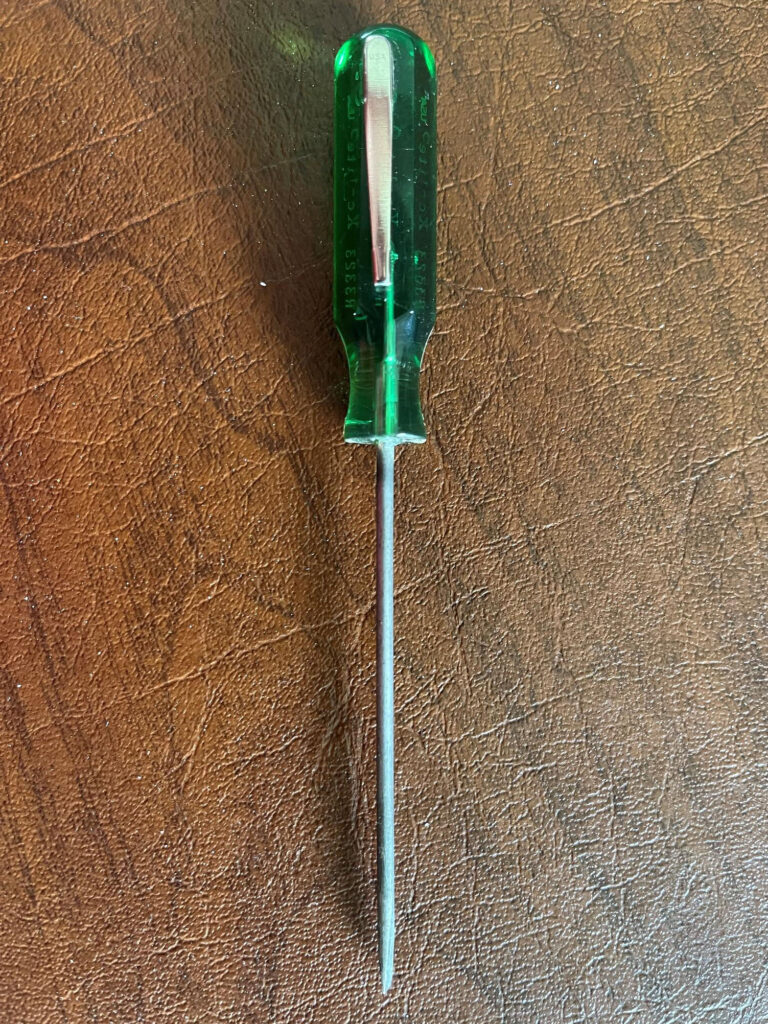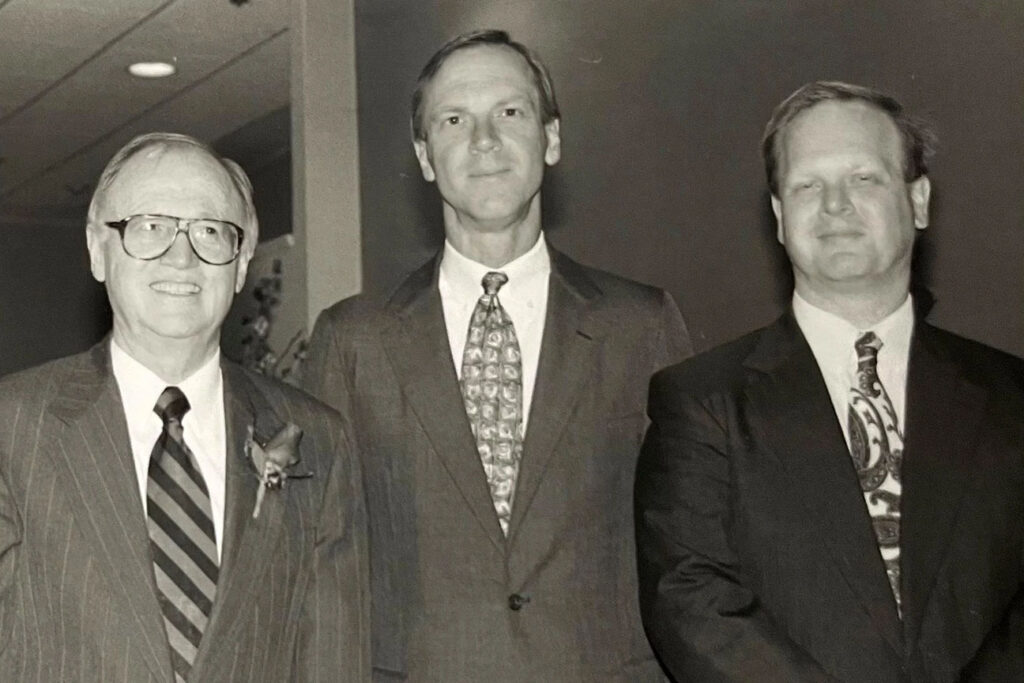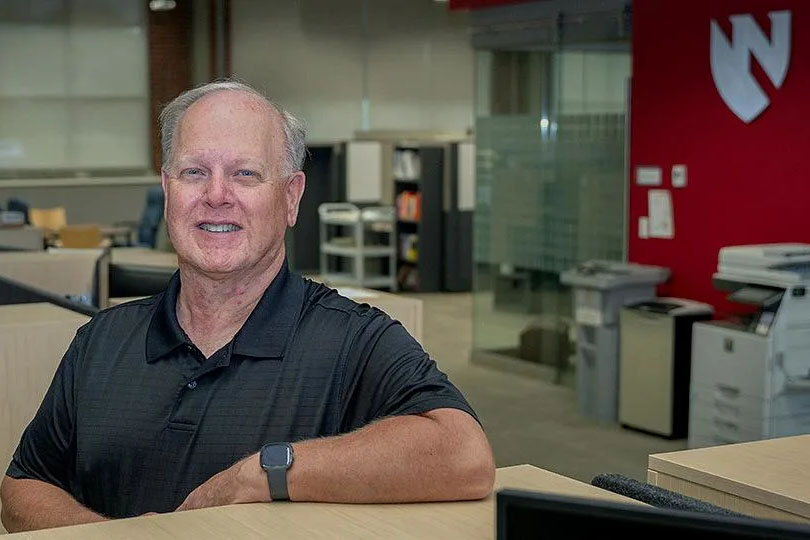To call the med center a home for Rick Gardner might be an understatement. From the day he was born at University Hospital, he was destined to be a part of the UNMC and Nebraska Medicine family.
This month, the senior programming analyst celebrated his 40th service anniversary, but his passion for this second home began decades before his professional journey.
“When I was 3, my dad began to take me to his office on the weekends as he prepared for the upcoming week’s classes,” Gardner said. “He’d show me different things, trying to get me interested in medicine. Medicine wasn’t my cup of tea, but I ended up working here.”
Gardner’s father, Paul Gardner, PhD, was an anatomy professor at UNMC, retiring in 1995 as assistant vice chancellor for Academic Affairs. Instead of medicine, Gardner developed a passion for technology and computer programming. He first joined the med center in 1985 as a data tech.

“I remember data techs would wear these red polyester jackets and carry a little green screwdriver that they gave you to go around and maintain everyone’s PC,” he recalls, noting he still has that screwdriver today. “If I had had a pedometer back then. I’m sure I would have easily gotten 30,000 to 40,000 steps in a day.”
His career progression would include working as an operator in computing services, now known as IT, while he finished his degree in management information systems. He then worked as a programmer, programmer analyst and currently as a senior programmer analyst with the electronic medical record support team.
Some of the memories he recalls from his various roles include having done rounds each morning to ensure all clinics and nursing stations had enough printer paper for the day. As a programmer in the early years, and before cloud server storage was even a thought, Gardner remembers having to use punch cards, magnetic disks, magnetic reel tape and cartridges to store data.
And of course, for those born before 2000, who could forget Y2K?
“All of us in IT worked for about two years preparing and fixing programs ahead of Y2K,” Gardner said. “On that New Year’s Eve, we all took shifts and were on site for when the clock struck midnight, and we were happy that all of our pre-work paid off.”
There have been numerous changes Gardner has witnessed and experienced in his field.
“When I first started, the hospital information system would have a four-hour downtime each night at midnight for backup, so for those four hours each night, the hospital would have to use paper for everything,” he said. “Today, we may have a 45-minute scheduled downtime every few months over a weekend.”
Gardner also remembers the nights, with a pager at his bedside, when he would have to be on call whenever a system went down.
“There was no remote access back then, so you would have to drive in to fix the problem quickly so the floors would get their reports done on time and we could bring the system back up,” he said.

Gardner has experienced many changes.
“Somebody once told me, ‘Keep doing your job, and if there is something you don’t like about it, in the IT world, it’ll probably change in the next week or so,’ and it always has,” he said.
Gardner always has liked the continuous learning that comes with working in IT.
“Every time we switched to a different system, it seemed like I upped my knowledge, so you’re constantly learning new things,” he said.
Whether it was doing interfaces with Phamis Lastword to working on Centricity to now assisting in One Chart downtimes, regulatory downloads to One Chart, and facilitating the meetings for the Change Advisory Board using Service Now, the thing Gardner has relied on is his detail-oriented approach.
“Rick has held different roles over the years, all equally important, but the one that stands out is that he has participated in every Epic upgrade call since our initial go-live,” said Sophia Chege, manager for integrated technology solutions. “Behind the scenes, he ensures upgrades occur on schedule across all environments and that the technical teams are informed about what actions to take and when to take them.”
Gardner said, “I take pride in helping keep things up and going. It’s always been a high priority of mine.”
Gardner takes pride in ensuring he hands off his responsibilities to the next person who fills his role.
Now that Gardner has hit his 40th service anniversary milestone, the next achievement will be on Jan. 12, 2026, when he will retire from a place that has meant so much to him and his family.
“It’s sort of scary because I’ve done this for so many years,” he said about looking ahead to retirement. “It’ll be tough to leave, because I’ve made a lot of lifelong friends here, but I don’t think I will get away from here permanently.”
Gardner’s wife, Jeannette, works for UNMC in biochemistry and has worked at the med center for nearly 38 years.
“My wife and I never thought we would stay in one place for 40 years, but I was fortunate to have multiple jobs and opportunities here,” Gardner said.
In retirement, Gardner plans to stay busy by biking and golfing more and hiking when he and his wife travel to the next national park on their list.
As Gardner reflects on the decades spent at the med center and the ties he has to the place, with his father, wife, brother, niece and brother-in-law all having worked here, it will forever be a home.
“They say Nebraska is a great place to raise a family. Well, working at the med center is also a great place to raise a family,” Gardner said. “I was able to work and still spend quality time with the family that I needed.”

Congratulations Rick!
Rick-you have had quite an impressive career!
Congratulations on 40 years Rick! Many fond memories of change management calls and I wish you the best in your retirement.